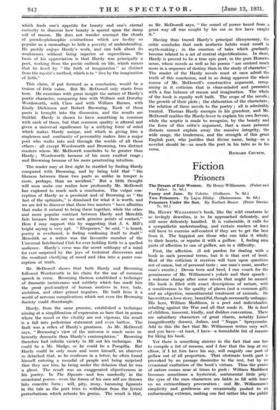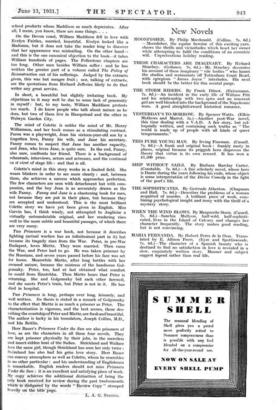Fiction
Prisoners
Fanny and Jane. By Colette. (Gollancz. 7s. 6d.) MR. HENRY WILLIAMSON'S book, like the wild creatures he so lovingly describes, is to be approached delicately, and still more delicately handled. It is vulnerable, it calls for a sympathetic understanding, and certain readers at least will have to exercise self-control if they are to get the best from it. The happiest are those who can take it wholly to their hearts, or repulse it with a guffaw. I, feeling nine parts of affection to one of guffaw, am in a difficulty.
First, the affection. (I ask pardon for dealing with a book in such personal terms, but it is that sort of book. Most of the criticism it receives will turn upon questions not of canon, but of personal taste ; one man's meat, another man's emetic.) Devon born and bred, I can vouch for the genuineness of Mr. Williamson's yokels and their speech— a welcome change after some novels that might be named. His book is filled with exact descriptions of nature, with a sensitiveness to the quality of places (not a common gift), and an objective, unsentimental treatment of animals. He has written a love story, beautiful, though necessarily unhappy. His hero, William Maddison, is a poet and individualist, rebelling against the. War and all that made it. He is fond of children, innocent, kindly, and dislikes convention. There are subsidiary characters of great charm, notably Lionel (magnificently drawn), Julian, and " Napps " Spreycombe. Add to this the fact that Mr. Williamson writes very well, and you have—at least, I have—a formidable list of reasons for liking his book.
Yet there is something sinister in the fact that one has to compile a list of reasons, and I fear that the imp at my elbow, if I let him have his say, will magnify one part of guffaw out of all proportion. That obstinate tenth part is provoked by no passage dissimilar to the rest, but by an cccasional exaltation of the book's virtues. Thus the praise of nature comes near at times to gush : William Maddison becomes sometimes a hysterical, sentimental little prig : the eyes of the men characters are liable :to fill with tears on no extraordinary provocation : and Mr. Williamson's simplicity and gentleness are occasionally pushed to an embarrassing extreme, making one feel rather like the public school products whom Maddison so much deprecates. After all, I mean, you know, there are some things... .
On the Devon coast, William Maddison fell in love with Evelyn Fairfax, married, beautiful. Evelyn looked like a Madonna, but it does not take the reader long to discover that her appearance was misleading. On the other hand— and this is the one canonical objection to the book—it takes William hundreds of pages. The Folkestone chapters are too long. Other men besides William suffer : and he has written the greater part of a volume called The Policy of Reconstruction out of his sufferings. Judged by the extracts given, this was but meagre fruit ; nor, talking of extracts, are the quotations from Richard Jefferies likely to do that writer any great service.
In short, a beautiful but slightly irritating book. My objections to it may well be due to some lack of generosity in myself : but, to my taste, William Maddison protests too much. I do know people who talk about nature as he does, but two of them live in Hampstead and the other in Welwyn Garden City.
The mind of Colette is unlike the mind of Mr. Henry Williamson, and her book comes as a stimulating contrast. Farou was a playwright, Jean his sixteen-year-old son by a forgotten love, Fanny his wife, and Jane his secretary. Fanny comes to suspect that Jane has another capacity, and Jean, who loves Jane, is quite sure. In the end, Fanny, also sure, confronts her friend. There is a background of rehearsals, interviews, actors and actresses, and the continual va et vient of stage life : and that is all.
Colette's mind in this story works in a limited field. She wears blinkers in order to see more clearly : and, between them, she achieves a success which approaches perfection. The few characters are seen with detachment but with com- passion, and the boy Jean is as accurately drawn as the wife Fanny. Fanny and Jane is a chastening book for men, not because they are put in their place, but because they are accepted and understood. This is the most brilliant Colette story we have yet been given in English. Miss Garvin has, I think wisely, not attempted to Anglicise a virtually untranslatable original, and her rendering rises well to the more subtle and beautiful passages, of which there are very many.
Two Prisoners is a war book, not because it describes fighting (actual warfare has an infinitesimal part in it) but because its tragedy rises from the War. Peter, in pre-War Budapest, loves Miette. They were married. Then came the War, and Peter had to go. He was taken prisoner by the Russians, and seven years passed before his face was set for home. Meanwhile Miette, after long battles with her aroused nature, became the mistress of the handsome Gol- gonszky. Peter, too, had at last obtained what comfort he could from Zinatchka. Then Miette hears that Peter is returning. She and Golgonszky bid each other farewell, and she meets Peter's train, but Peter is not in it. He has died in hospital.
Two Prisoners is long, perhaps over long, leisurely, and well written. Its thesis is stated in a remark of Golgonszky to the effect that Miette is as much a prisoner as Peter. The characterization is vigorous, and the best scenes, those des- cribing the courtship of Peter and Miette, are fresh and beautiful. The author is lucky in his translators, Joseph Collins, M.D., and Ida Zeitlin.
Herr Bauer's Prisoners Under the Sun are also prisoners of love, as are the characters in all these four novels. They are kept prisoner physically by their jobs, in the merciless and insect-ridden heat of the Sudan. Strickland and Wallace love the same girl, though Strickland has seen her only twice : Sviirehmd has also had his grim love story. Herr Bauer can convey atmosphere as well as Colette; whom he resembles in no other particular : and his understanding of Englishmen is remarkable. English readers should not miss Prisoners Under the Sun : it is an excellent and satisfying piece of work. My copy achieves the additional distinction of being the only book received for review during the past twelvemonth whichAs ' disfigured by the words " Review Copy" stamped heavily on the title page.
L. X: G.







































 Previous page
Previous page